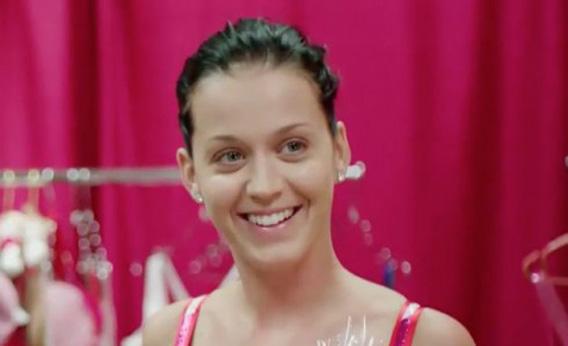Here’s the totality of my experience of Katy Perry before walking into her new self-produced concert documentary, Katy Perry: Part of Me: I knew her as a tabloid item, the pop star who recently ended her marriage to the English comedian Russell Brand. I was familiar with the assaultively cute style of her music videos—candy-colored, cartoonish, blending the childlike with the coyly sexual. (The one that’s stuck with me the longest, unfortunately, was the “California Gurls” video where she sprays jets of whipped cream out of her bra in slow motion.) And I had heard a good friend’s 6-year-old daughter belt out “Firework,” Perry’s self-esteem-boosting megahit, a few dozen times in impromptu atop-the-couch performances.
My own 6-year-old, to my relief, decided after a brief period of co-“Firework”-belting that “Katy Perry is too girly.” That pretty much sums up my resistance to Perry too—without knowing much about her music, I felt an instinctive aversion to the brand of femininity she peddled. In 2008, she turned the heterosexual party trick of girl-on-girl kissing into her first No. 1 single with “I Kissed a Girl.” Perry’s ode to Sapphic osculation, unlike Jill Sobule’s 1995 song of the same title, doesn’t celebrate the excitement of sexual self-discovery, but the thrill of rebellion, of getting away with something titillatingly naughty. Similarly, “Ur So Gay” approaches straight-up homophobia with its teasing chorus, addressed to an effete boyfriend: “You’re so gay/ And you don’t even like boys”). In Part of Me, much is made of what a rebel Perry is, how she inspires her tween- and teenage fans to have the courage to be themselves. But though I left the film with a slightly higher opinion of Perry as a singer and songwriter, she continues to strike me as desperately ingratiating: A nice, pretty Christian girl who just wants as much of the world as possible to love her.
The “nice” part may well be engineered by the documentary, of course: All of Perry’s on-screen interactions with intimates, especially a painfully stiff visit to her grandmother, feel as phony and staged as the post-show meet-and-greets with her fans, and we’re left with zero sense of what she’s really like as a granddaughter, sister, boss, or friend. As for the “Christian” part, it matters to Perry’s career in a way I hadn’t realized before: The daughter of traveling Pentecostal ministers, she began singing in church and put out a gospel album at the age of 16. (In a few clips of Perry from this period playing acoustic guitar, you can hear what her voice sounded like before it was accompanied by a wall of in-studio production sound—it’s sweet, tuneful, but not particularly distinctive.) Perry’s parents appear, briefly, to lament their daughter’s often-revealing costumes and risqué persona, but they also seem proud of her success. And as for “pretty”: Well, the good Lord has endowed Perry with porcelain skin, raven locks, and a pair of huge blue eyes that rival Zooey Deschanel in their sheer Japanimation cuteness. She also has a Barbie body, at once lithe and voluptuous, perfect for the retro-fairy-tale-princess costumes she’s known for sporting on stage (one whole number revolves around spectacular costume changes, with one ice-cream-hued creation succeeding the next in seemingly endless layers). But as easy on the eye as Perry is, moving gracefully on stage is not her forte; in front of her crew of professional backup dancers, her modest gifts as a dancer are starkly apparent. I found myself looking forward to the rare moments when she would just stand at the microphone and sing.
There’s no denying that Perry has a hell of a work ethic, and if you like bubbles and dancers in lavender kitten suits and backdrops that recall an 80s-vintage Lisa Frank spiral notebook, I’m sure she puts on a hell of a show. The 2011 world tour this documentary chronicles was a grueling one, with an elaborate two-hour stage show nearly every night of the week for months on end, and rare days off spent flying around the world in an attempt to save her crumbling marriage. If you’re interested in the details behind the Brand/Perry breakup—well, a) get a life, but b) you will be sadly disappointed by the dirt on offer here. Brand appears only in the briefest glimpses, never sits down for an interview, and is rendered in only two, harshly contrasting lights: First the teddy-bear hubby affectionately snogging with his wife backstage, then the cold, distant “One That Got Away” (to quote Perry’s confessional ballad of the same title, which we hear in its entirety in teary close-up). There’s no mention of Brand’s well-documented struggles as an alcoholic and drug addict—in fact, there are no unwholesome substances anywhere on view in Part of Me, with the exception of the you-go-girl blackout drinking Perry espouses in her mega-hit “Last Friday Night.”
About “Last Friday Night.” Not to sound like a scold, but I agree entirely with the comedian Rob Delaney’s brilliant line-by-line breakdown of this song, in which he takes the unnamed protagonist (and by association, Perry) to task for glamorizing a nightlife that includes unprotected sex with strangers, drinking to the point of amnesia, and possibly sexual assault. Why do I care whether a pop singer I never voluntarily listen to hits it big with a cute ditty about how awesome it is to spend your Friday nights doing stupid, dangerous shit? Maybe because I have a daughter who’s a born ham, someone who, like the younger Katy Perry we see in old home video footage in Part of Me, has dreams of standing on a stage one day doing something—singing, dancing, playing an instrument—in front of a cheering crowd. If and when that time comes, I want her to know she has options besides spraying whipped cream out of her bra.
